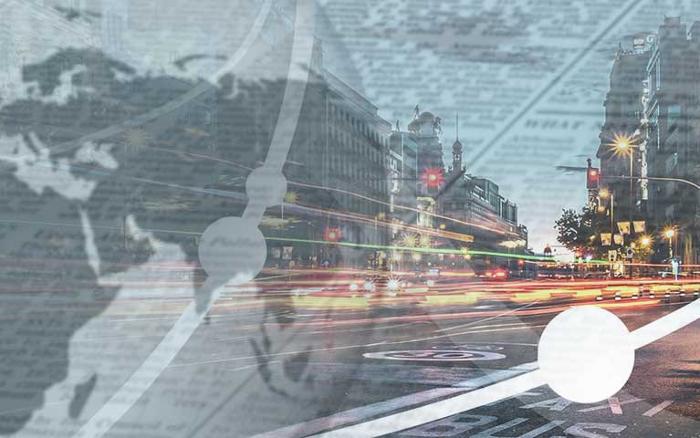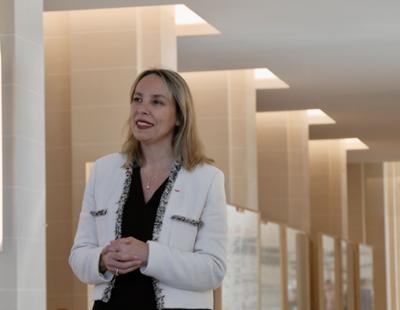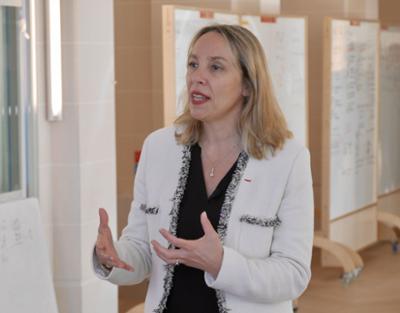

Interview with Clotilde Delbos, Mobilize CEO
“We don’t want to sell cars, we want to sell services and represent 20% of Renault’s turnover by 2030”.
On the eve of its 125th anniversary, Renault is determined to disrupt the global mobility industry through its newest brand Mobilize. “We don’t want to sell cars, we want to sell services” boldly says Mobilize CEO, Clotilde Delbos, at the historical Dreyfus Building and C-Suite HQ, just a few meters away from the small old garage where, 131 years ago, Louis Renault set up his first workshop in the garden of the family house. This became the birthplace of Renault’s iconic “voiturette” in 1891. What came next is written in history books. Now, through Mobilize, the French carmaker wants to Renaulutionize the industry by shifting the focus from vehicles to people’s mobility needs.
1.- What are Mobilize’s vision and ultimate goal?
Our vision is very simple. We want to provide greener, shared and accessible mobility to all and in doing so, we won't sell vehicles anymore. We will sell services from financial services, insurance, payments, energy solutions, and maintenance. Everything in a one-stop shop. Our goal is to represent 20% of Renault Group’s turnover by 2030 and all of that obviously while being profitable with a double-digit margin. It's very ambitious. [Renault Group turnover amounted to 46.2 billion euros in 2021]
2.- What does sustainable mobility mean for you?
We think that mobility is going to change. It must change. Why? Because today, there are things that are not fair. For example, people buy a car, which they don't use more than 10% of the time and then when they want to resell it, the car is worth only 50% of its initial cost. And we all know that transportation is responsible for roughly 15% of the CO2 emissions in Europe, so this must change. Our vision is a that of a more green, sustainable, and shared mobility. And that is what we're working on.
3.- What are Renault Group's sustainability goals?
We want to be carbon neutral by 2040 in Europe and by 2050 worldwide. For doing so, we have a roadmap based on electric cars and we want to have more and more shared mobility and a better use, and to have better usage of the life cycle of the car. We're very committed in terms of circular economy, notably with the Re-factory in France, at Flins, where we want to refurbish 45,000 cars per year. And Mobilize is a central component in this sustainability roadmap.
4.- Which barriers do you see in the way to a more sustainable mobility? And what needs to happen for industry and policy to move faster and farther?
I think there are many things that need to be done. First, as we do, we need to really understand the needs of the new generation, that really wants to be greener. That's why we created Mobilize, which is, in my view, a militant brand. The industry must understand that it needs to take into account the needs of the specific users, producing cars made out of recycled materials, cars that can circulate in the city centres. Nevertheless, we know that there are a lot of roadblocks. For example, there are not enough charging points, which is also a lever that Mobilize wants to work on. We need to give easier access to different mobility modes. Incentives are one way, but there is a backlash on incentives, so it's not necessarily the thing that needs to be done. Public authorities also need to understand that this transition will take time. Forcing a transition in a very short time is good for the planet but is it acceptable for the users? Users need to have the resources to access mobility solutions which become more expensive. Again, in Mobilize we're trying to give this access to people through Mobilize Financial Services, for users to easily access cars that are cheaper and more respectful of the environment.
5.- What is the place of customers and society in all these efforts?
Our approach differs from the approach of traditional Original Equipment Manufacturers (OEM). OEMs think first about the product. In Mobilize, we think about the user first, not as a customer necessarily. We reflect on the user’s mobility journey; about what type of services we want to offer. Then we can think of designing the car and the software platforms needed to offer those services. That means that before designing all these services, we talk a lot with users and mobility operators that buy our services in order to provide seamless, friendly, fun and CO2-efficient services. These operators can be car-sharing companies, taxi companies, taxi drivers, last-mile delivery logistic professionals, etc. The goal is to design services that really make the most sense for users and customers, which they really need, which save them money and, at the same time, are profitable. That's the story of Mobilize, providing vehicles as a service, built based on the user experience and not on the product as a traditional OEM would do.
6.- How can Global Mobility Call help you advance your sustainability goals?
We are very conscious of the fact that we cannot change the world just by ourselves. We need to work with others, notably in the mobility business, and Global Mobility Call gives us the opportunity to talk to other mobility operators more broadly, to companies working in the mobility area. We do this in France extensively. Here we have created what we call Mobility 360 with RATP, Uber and Bla Bla Car, thus not just carmakers but mobility actors which are the ones talking directly to the users daily. Being at Global Mobility Call is very important for us to strengthen existing links and create new bonds with other mobility actors, with a much broader geographical scope.






